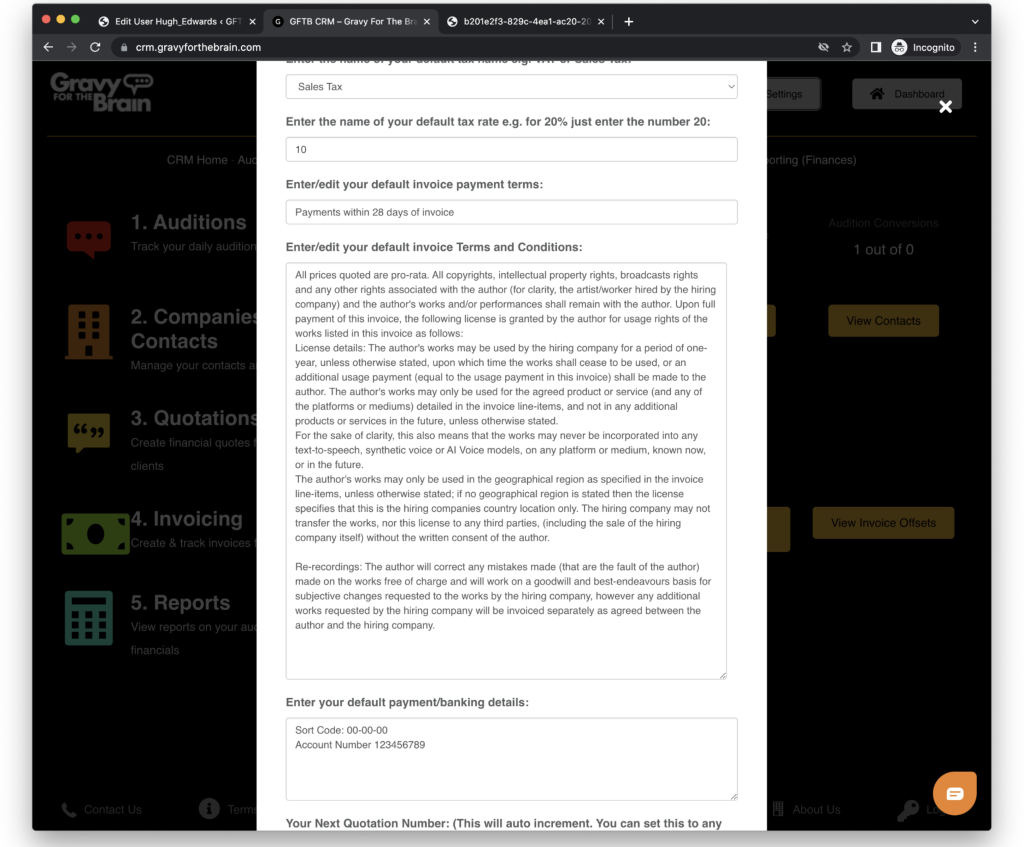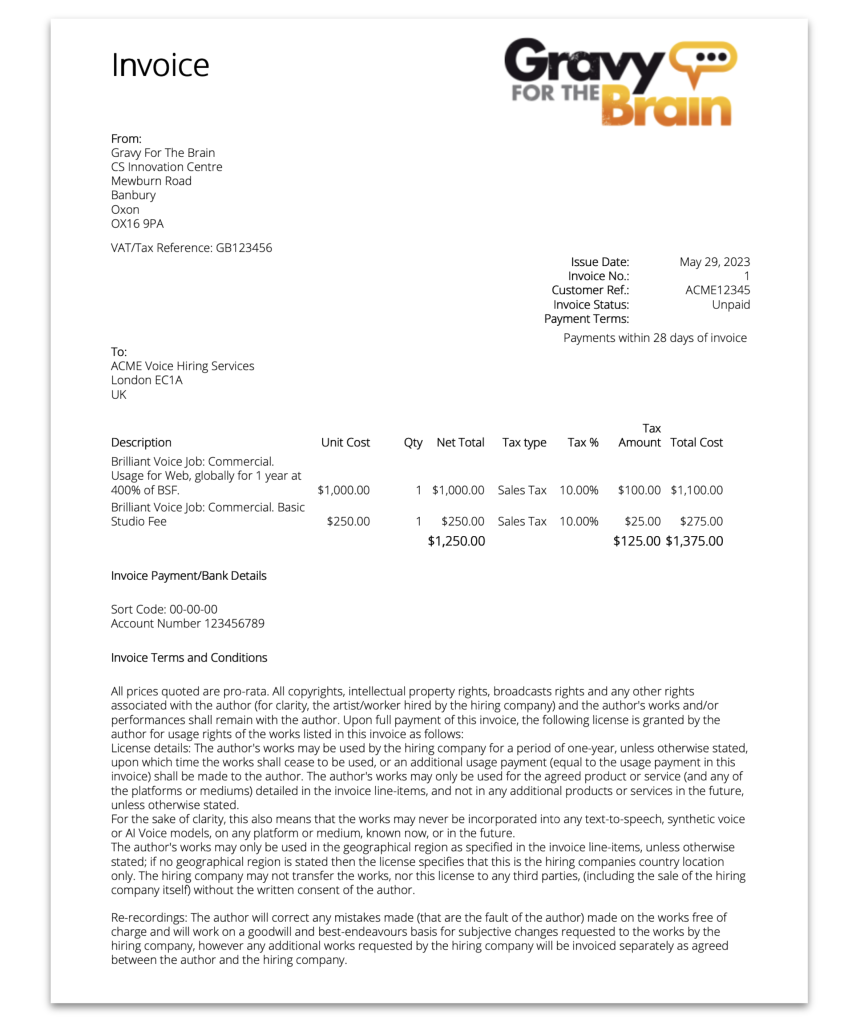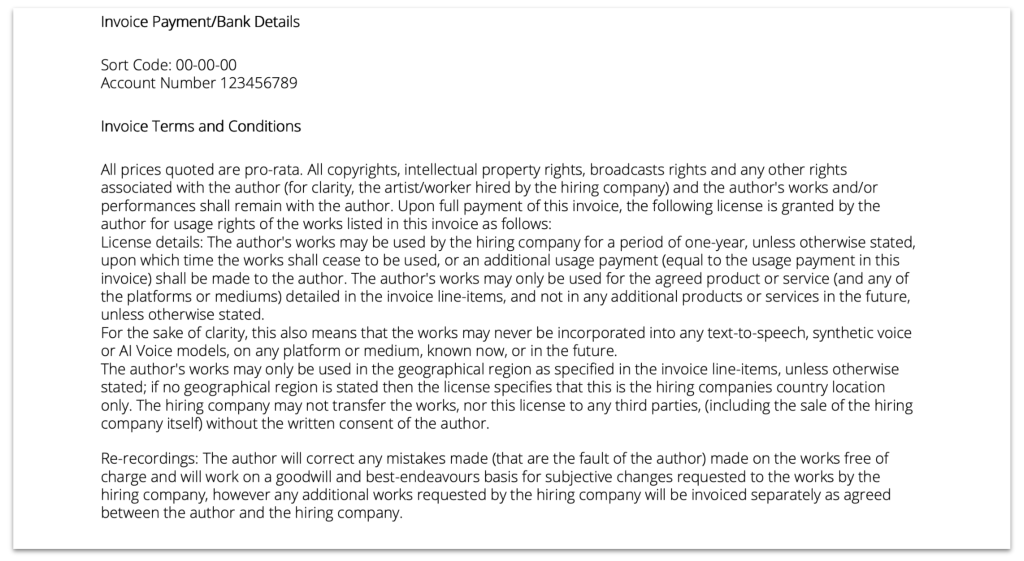
This article illustrates exactly why you should use voiceover contracts with every single voiceover job you do, and how you should use them. If you do not use voiceover contracts for each voiceover job you do, you are potentially leaving yourself open to companies taking advantage of you, your recordings, and them potentially exploiting the works in ways that you had not agreed to.
Why Should I Use Voiceover Contracts?
There are many reasons that you should use voiceover contracts.
Some people believe that when you are paid for a voiceover job, you give away your rights to those recordings to whoever hired you, but this is incorrect. In fact, you license the use of those recordings for a specific time, a specific location, specific platforms and for a specific number of uses – see this blog on A licensing guide for hirers for more information.
But here are some of the main reasons you should always use voiceover contracts:
- To protect yourself legally
- To ensure that your voice and voice recordings are only used where you agree they should be used
- To ensure that you are paid fairly for what you do
- So that people do not take advantage of your business
- To increase your income by relicensing in the future
- To ensure that your voice is not cloned, nor used for anything you did not intend, such as an AI or TTS model
But Isn’t Insisting On Contracts Going to Put Off Clients?
This is an often-asked question. But to answer it, we need to understand something else. What actually is a contract? Why are they needed?
Effectively a contract is to be able to prove that both parties had an agreement, so if one or more of the parties start to disagree, there is a way of proving that there was an agreement in the first place, and what that agreement was.
What this means is that we need to be able to prove the terms that we want abided to.
This could be via traditional voiceover contracts, where we get the person to physically sign a document, or it could be terms specified on your quotation and invoices.
What are the Important Things that Need to be on a Voiceover Contract?
There are several things that should be listed in your voiceover contracts. These include (but not limited to!) the following:
- Your details
- What the voiceover job actually is and how it is defined
- Who the hiring client is
- The terms of the license you are granting to the client
- On what platform/where the voiceover files will be used
- The duration or term of the license
- Which global locations the voiceover files will be used
- (If relevant) How many uses / iterations your voiceover files can be used for
- Terms to say that the license cannot be reused without consent
- Terms to say that the license cannot be sold on without consent
- Terms to say that the voiceover recordings cannot be used for any other purpose
- Terms to say that the voiceover recordings cannot be altered, or used to create any kind of synthetic voice model
By way of an example then, your contract might stipulate that your voice recordings are for Project X, that the license term is one year, that it can be used only in the united States, and unlimited use but online only.
Why Do We Need to Specify Synthetic Voice Models in All Contracts?
AI voice models are now incredibly easy to create. If you do not protect yourself on all voiceover jobs – even those that are not intended for AI use – you could find your voice being used to create a voice model without your consent, and being used to voice products without your consent, and without remuneration.
If, for example, you did a 30,000 word e-learning project, and signed away an unrestricted in-perpetuity buyout, there would be nothing to stop that company creating a voice model with those files, and using it to create unlimited e-learning projects without ever having to pay you again!
So it’s imperative, that no matter what the voiceover job, you ensure that you specify that these voiceover files may not be used to create any kind of synthetic voice model.
NAVA, the North American Voiceartists Association has created an AI Rider that you might want to consider using if you are using the traditional type of voiceover contracts. However this rider/addendum only works if you are using traditional voiceover contracts where both parties actually sign the document.
It will not work for all types of job where you do not use these kinds of traditional contracting.
So, What’s the Easiest Way to Protect Yourself Using Voiceover Contracts?
The simplest and easiest way to protect yourself is to add the terms you want to include to your estimates and your invoices.
This can be done easily on every single job you do.
In the Gravy For The Brain Voiceover CRM, each estimate/quotation or invoice you create comes with a pre-defined set of terms and conditions that you can change or update as you see fit.
You can choose to use the Voiceover CRM for your estimates and invoices, or you can use a third party CRM or accounting software to do it, but the principle remains the same.
The GFTB Voiceover CRM is free to all members.
For now, let’s see how we do it with the GFTB Voiceover CRM:
1. Set Your Default Terms and Conditions:
Look at this illustration of the GFTB Voiceover CRM. You will see that you are automatically provided with some base terms and conditions, which you can edit to suit you:

Whenever you create an invoice or an estimate, you will see these terms and conditions appear automatically.
2. Create your Estimate or Invoice, and Specify Your Line Items
Create your invoice or estimate, and ensure in the line items that you are specifying where and for how long your recordings are being used for.

In this example above, we can see that we have specified the Basic Studio Fee (session fee) in line one, and then the usage (web, globally, 1 year, 400%) in line 2.
3. Print and Send the Full Estimate or Invoice
Once you’ve specified the line items, your terms and conditions of that license appear automatically on the full document:

4. A Closer Look at the Terms & Conditions
Let’s take a closer look at those terms and conditions. It’s worth reading these in full so that you fully understand what is written and why:

This is saying that if the hirer pays the invoice, the license is granted – meaning that if the invoice is not paid, the license is not granted, and under law this means that the hirer has no legal right to use the recordings in any way.
It also stipulates that the terms are in the line items, but that if they are not, then they may only be used in a certain way.
Crucially, it stipulates that this license may not be used for any synthetic voice models, and may not be transferred or relicensed.
But What About P2P Sites?
Working with the P2P Job Sites are slightly different. With some of these sites, you are introduced to the client and you invoice them directly. In these cases, follow the above models of either standard voiceover contracts, or licensing on the estimates & invoices.
Some P2P sites however, pay you directly and do not let you invoice the clients directly. In these cases, you are forced to accept their terms, rather than your own terms.
Unfortunately there really isn’t much you can do about that.
However, we do recommend that you only work with P2P sites who have written into their terms and conditions that your voice recordings will not be used for synthetic voice models at any time, even if the usage is listed as in-perpetuity buyout.
And, What About In-Perpetuity Buyout Contracts?
Even if you agree to in-perpetuity buyout voiceover contracts, you must remember that these are still only licenses granted to the hirer, and you should still include all the other terms on the estimates and invoices.
For example, you should still include the terms that say that your recordings cannot be licensed to 3rd parties, and that your recordings may not be used to create a synthetic voice model.
Especially with the latter, all companies should agree to this – and if they do not, it should raise a rather large red flag to you – as it’s likely that they will try and use the recordings to create a synthetic model in the future!
Can I Avoid In-Perpetuity Buyout Contracts?
Yes, in many cases you can. For more information on how to do this, please see the How to Negotiate course and webinars that are available to you for free from your Gravy For The Brain members dashboard.
Our Own Voiceover Contracts Disclaimer!
This being a blog – which we hope you have found useful – on all things legal, it’s important to note that this blog should not be taken as legal advice – we are not lawyers, and this information is intended for educational purposes only. You should consult with your own legal professional before creating any legal contracts, and Gravy For The Brain will not be held responsible for any content that you may use from this article in your own documentation.
There! Had to get that out of the way!
We hope you have found this useful – and please do make sure that you protect yourself for the future!
Leave a Reply
You must be logged in to post a comment.